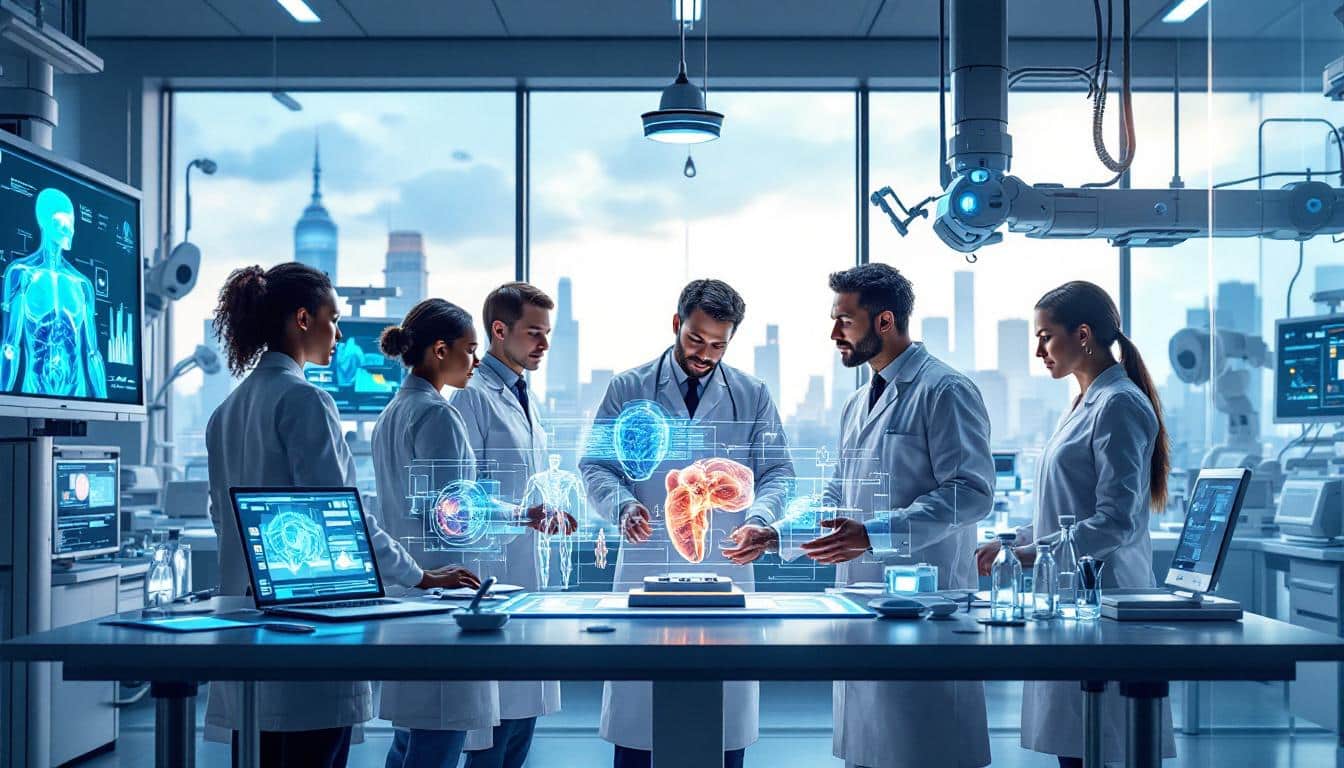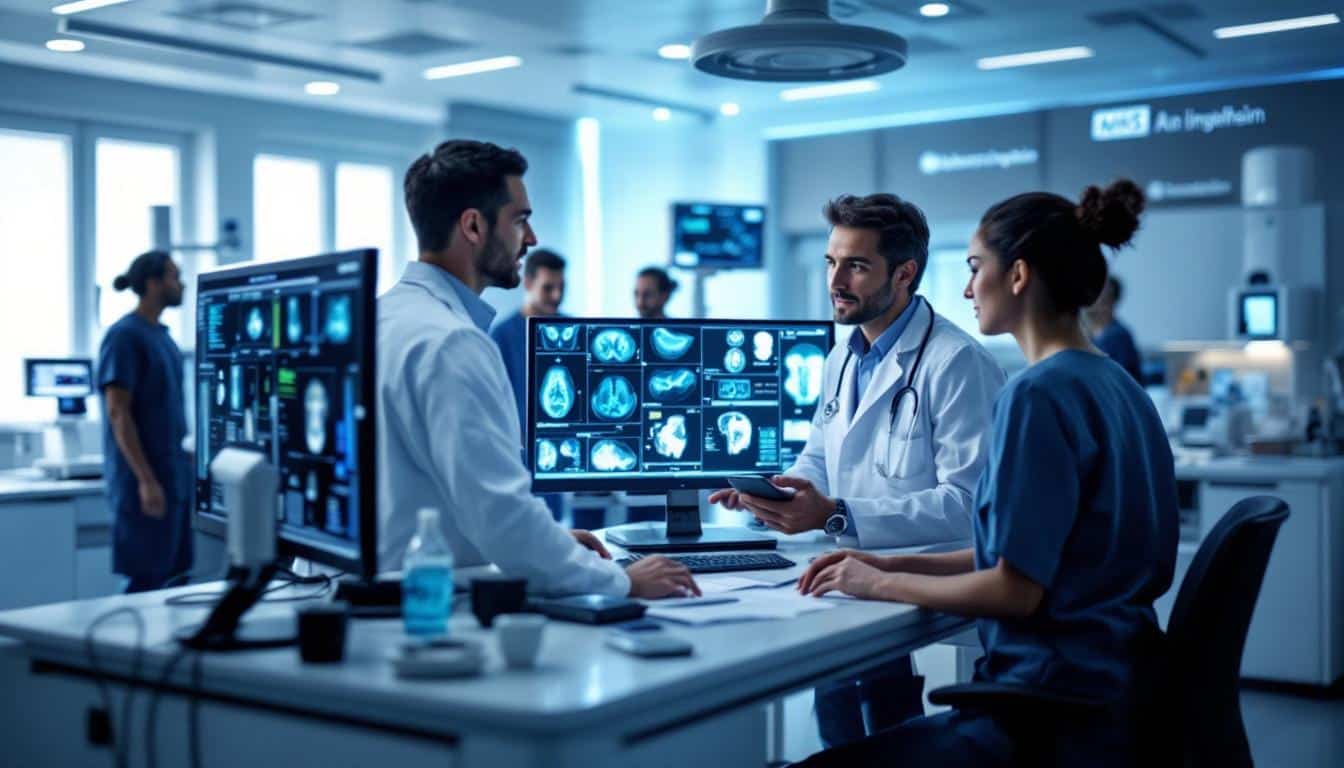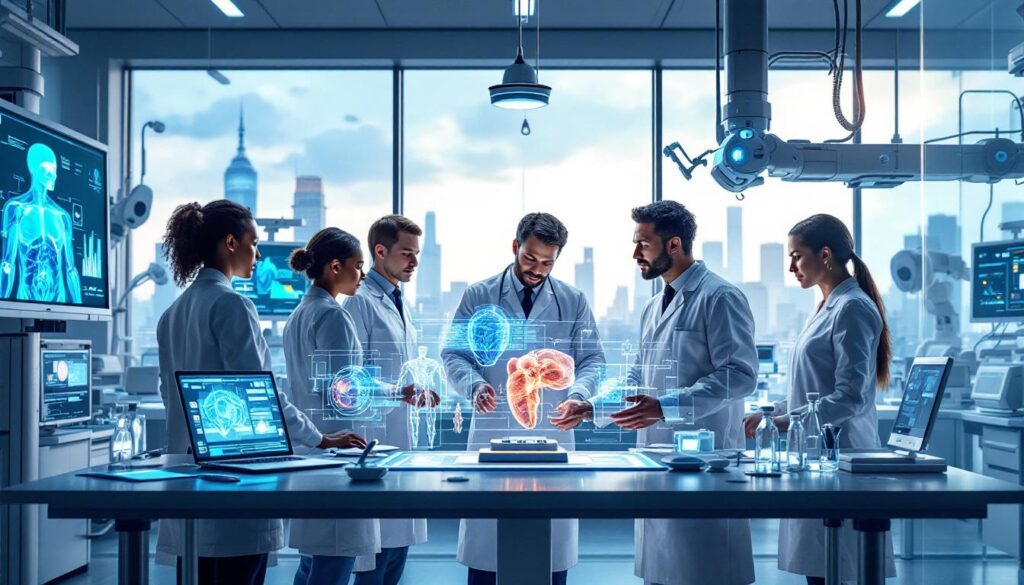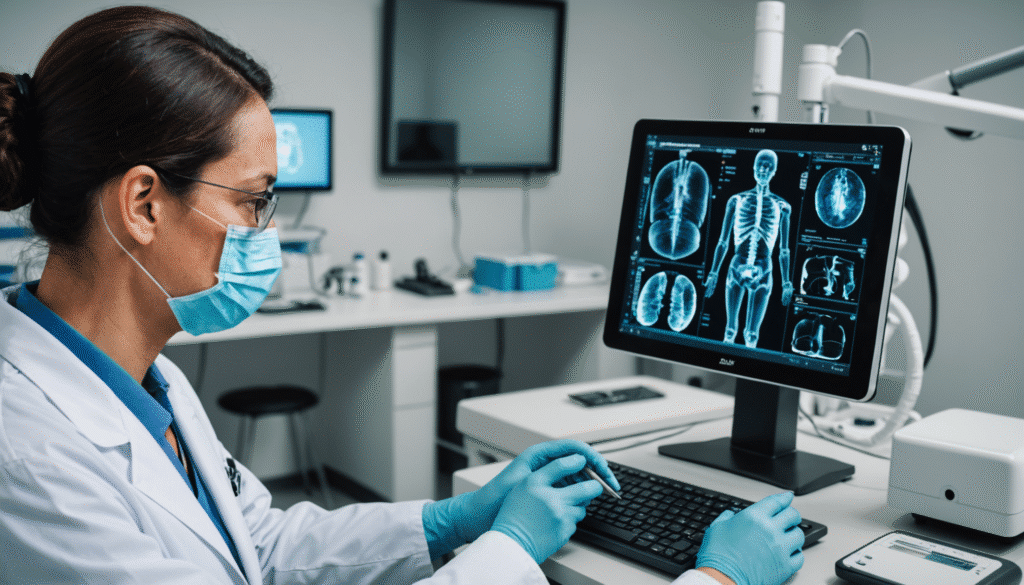“`html
Welcome to our Weekly Summary of Healthcare IT Today. Each week, we will revisit published articles and highlight their importance to the health information technology community. This edition offers you the opportunity to stay updated on the latest innovations and trends in the industry.
This week, we explore how artificial intelligence and innovation are transforming hospital operations. During HIMSS25, John Lynn led a roundtable with experts from Augusta Health, AltaMed, AMD, and Dell Technologies, discussing supply chain optimization and workforce transformation through the adoption of digital health.
Sachin K. Gupta, CEO of IKS Health, emphasized the importance of automating clinical tasks such as documentation, coding, and prior authorizations, allowing clinicians to focus more on patient care.
Chris Larkin of Concord Technologies demonstrated how the automated extraction of key information from clinical documents can streamline workflows and quickly provide necessary data to healthcare professionals.
Ben Scharfe of Altera Digital Health explained that different use cases of AI present varying levels of risk, and that clinical applications require rigorous validation to ensure patient safety.
Tom Niehaus and Chad Alessi from CTG shared cybersecurity strategies, such as automated monitoring, the Zero Trust strategy, and scenario-based testing, to strengthen the health ecosystem against vulnerabilities.
Jim Jacobs, CEO of MediQuant, stressed the necessity of accessing complete data archives to optimize AI efforts, highlighting the challenges of consolidating and cleaning data from disparate legacy systems.
The Healthcare IT Today community discussed ways to make AI-driven health solutions accessible and equitable, including customizing solutions, investing in training for providers and patients, and using representative datasets.
Colin summarized five key points from a roundtable of HIMSS25 experts on AI, emphasizing the understanding of the time and effort required for providers to integrate AI and adhere to data integrity standards.
In the Life Sciences Today podcast, Rony Angel of Centarix discussed advancements in longevity, exploring molecular mechanisms that can slow and reverse aging, as well as the evaluation of effective therapies.
Another episode of the Healthcare IT Today podcast recapped the HIMSS and ViVE conferences, highlighting the impact of major conferences on the healthcare sector.
Patrick Kehoe of Messagepoint explained how generative AI can simplify the translation of coverage documents and benefits of Medicare Advantage programs into multiple languages, thus addressing the needs of MA organizations.
Rasmus Almqvist of Hibox described the role of telemedicine in delivering convenient care, particularly for preventive care and patients with chronic diseases, helping to bridge essential care gaps.
Rob Shavell, CEO of DeleteMe, presented measures to reduce cybersecurity risks in the healthcare sector, such as strict access controls, reduced reliance on data brokers, and regular software updates.
Dr. Sally Perkins of Authenticx discussed the importance of data storytelling to highlight the voice of the customer, combining quantitative and qualitative data to enhance organizational processes.
This week, job offerings in Health IT include several roles in information management, compliance, and patient access. Additionally, notable statistics reveal that 83% of physicians believe that patient portals increase administrative burden, while 91% of health CISOs are considering a job change.
On the financing and M&A side, CareCloud acquired MesaBilling, Epicore Biosystems raised $26 million in Series B funding, ModMed received significant investment from Clearlake Capital, and Reveleum secured investment from NEC X, the venture capital studio backed by NEC.
Welcome to our Weekly Summary of April 5, 2025. This week, we explored several significant advancements in the field of health information technology and medical innovation. Discover the trends, key discussions, and developments shaping the future of healthcare.
How are innovation and AI transforming hospital operations?
At the HIMSS25 conference, John Lynn moderated a roundtable featuring experts from Augusta Health, AltaMed, AMD, and Dell Technologies. The discussions focused on supply chain optimization and workforce transformation through the adoption of digital health. Integrating artificial intelligence not only streamlines operational processes but also improves care quality by automating complex tasks. This transformation is essential to meet the growing demand for efficient and personalized health services.
To learn more, check out our Weekly Summary.
What are the challenges of automating clinical tasks?
Sachin K. Gupta, CEO of IKS Health, emphasized the importance of automating clinical tasks such as documentation, coding, and prior authorizations. These tasks, while crucial, divert clinicians from their primary mission: patient care. Automation not only reduces administrative burden but also increases efficiency and accuracy in clinical processes. This translates to better resource allocation and overall improvement in care quality.
How does automated document processing improve clinical workflows?
Chris Larkin from Concord Technologies explained how extracting key information from clinical documents can simplify workflows and quickly provide clinicians with the necessary data. By using advanced information extraction technologies, hospitals can transform stacks of documents into structured databases, facilitating access and analysis of vital information for decision-making.
Why is it crucial to understand the risk levels associated with AI?
Ben Scharfe from Altera Digital Health stressed that not all AI applications carry the same level of risk. Clinical uses of AI require rigorous validation to ensure patient safety. Understanding these risk levels enables the development of AI solutions that are not only innovative but also safe and reliable, thereby ensuring their adoption by healthcare professionals.
How to strengthen the health ecosystem through cybersecurity?
Tom Niehaus and Chad Alessi from CTG discussed the importance of cybersecurity in the healthcare sector. They talked about strategies such as automated monitoring, the Zero Trust approach, and scenario-based testing to reduce vulnerabilities. Protecting sensitive patient data is paramount, and these measures contribute to creating a more secure and resilient health environment.
How do data archives fuel AI efforts?
Jim Jacobs, CEO of MediQuant, highlighted that AI applications require complete data archives to function effectively. Often, this involves centralizing and cleaning data from disparate legacy systems. Proper archive management allows for fully leveraging AI capabilities, facilitating more accurate analyses and better clinical decision-making.
What measures to take to make AI-driven health solutions accessible and equitable?
The guidance from the Healthcare IT Today community includes providing customizable solutions, investing in provider and patient education, and using representative datasets. These actions are essential to ensure that AI innovations benefit all populations, thereby reducing health disparities and improving access to quality care.
What are the key points from an expert panel on AI at HIMSS25?
Colin revisited notes from an expert panel at HIMSS25, revealing essential reflections such as understanding the time and effort required for providers to integrate AI, as well as adhering to data integrity standards. These points shed light on the challenges and opportunities associated with implementing AI in clinical settings.
How is longevity being redefined in the life sciences?
In the Life Sciences Today podcast, Rony Angel from Centarix discussed advancements that can slow or even reverse the aging process at the molecular level. He also addressed the evaluation of truly effective therapies and interventions, highlighting scientific progress that promises to lengthen lifespan and improve quality of life.
What has been the impact of the HIMSS and ViVE conferences?
The Healthcare IT Today podcast recapped the HIMSS and ViVE conferences, giving particular attention to the impact of major conferences in the healthcare realm. John and Colin shared their impressions of the diversity of discussions and the significance of these events for networking and exchanging innovative ideas.
How to ensure accuracy when translating Medicare Advantage documents?
Patrick Kehoe from Messagepoint showcased how generative AI can simplify the translation of coverage documents and benefits into up to two dozen languages. This automation helps maintain the accuracy and compliance of essential information, facilitating access to services for a diverse population.
Will video reshape the future of healthcare?
Rasmus Almqvist of Hibox described the role of telemedicine in offering convenient care, particularly for preventive care and patients with chronic diseases. Video helps bridge essential gaps in care, offering accessible consultations and improving care continuity.
Why do cybersecurity gaps persist despite increased spending?
Rob Shavell, CEO of DeleteMe, explained that despite increased investments in cybersecurity, healthcare organizations continue to face vulnerabilities. He recommended strict access controls, reduced reliance on data brokers, and regular software updates to significantly reduce the risk of cyberattacks.
How does data storytelling illuminate the voice of the customer?
Dr. Sally Perkins of Authenticx asserted that process improvement is better informed by combining quantitative and qualitative data from conversations with customers. This approach helps organizations develop empathy and build deeper connections, thereby enhancing customer satisfaction and loyalty.
What are the job opportunities in health IT this week?
This week, numerous opportunities are available in information management, compliance, and patient access. Various positions are open, offering exciting prospects for health information technology professionals looking to advance their careers.
What are the highlights of the week?
Here are some highlights from our Weekly Summary:
- 83% of physicians report that patient portals increase their administrative burden.
- 91% of CISOs in the health sector are considering changing jobs.
For more details, check out our Weekly Summary from February 8, 2025.
What are the recent financing and M&A activities?
This week’s financial movements include:
- The revenue cycle automation provider CareCloud acquired MesaBilling.
- The manufacturer of sweat-sensitive wearables, Epicore Biosystems, raised $26 million in Series B funding.
- The provider of specialized medical technologies, ModMed, announced significant growth investment from Clearlake Capital.
- The records management provider, Reveleum, secured an investment from NEC X, the venture capital studio supported by NEC.
These developments illustrate the ongoing dynamics and growing investment in the healthcare sector.
Discover our latest stories in health and IT
Don’t miss our latest stories in health and IT. Join thousands of your peers in health and HealthIT who subscribe to our daily newsletter to receive the latest news directly in their inbox. To sign up, visit our dedicated page.
For more information, check out our articles:
- Deux Chaises expands its mental health services to 19 new states
- Biography Demerge E30: Innovating for Health
- Weekly Summary from December 28, 2024
The week of April 5, 2025 was marked by notable advancements in the field of health technology. Discussions at HIMSS25 highlighted the impact of Artificial Intelligence and innovation on hospital operations, with experts emphasizing the importance of optimizing supply chains and transforming the workforce through the adoption of digital technologies.
The necessity to automate clinical tasks was also a central theme, as highlighted by Sachin K. Gupta of IKS Health. Automating documentation, coding, and prior authorizations allows clinicians to focus more on patient care. Additionally, Chris Larkin from Concord Technologies demonstrated how effective data management can improve workflows and provide crucial information quickly.
The management of risks associated with AI was also addressed, with Ben Scharfe from Altera Digital Health emphasizing the need for rigorous validations to ensure patient safety. Meanwhile, cybersecurity issues were discussed by Tom Niehaus and Chad Alessi from CTG, who presented strategies to reduce vulnerabilities through automated monitoring and scenario-based testing.
On the financing and mergers and acquisitions side, several companies have strengthened their market position. CareCloud acquired MesaBilling, while Epicore Biosystems raised $26 million in Series B financing. These strategic moves reflect the dynamic and ongoing growth of the sector.
Finally, initiatives aimed at making health solutions equitable and accessible were highlighted, particularly the importance of representative datasets and educating providers and patients. This week further demonstrated the commitment of the health technology community to innovate and continuously improve patient care.













